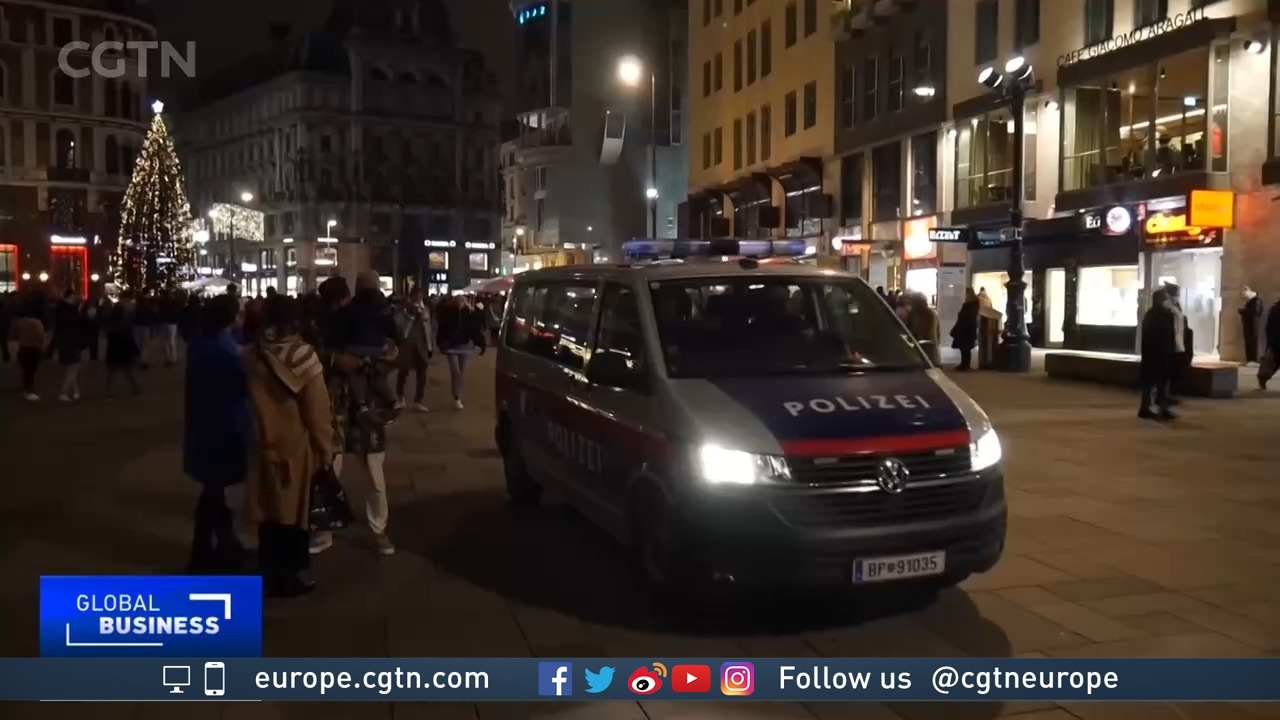
Police officers walk along a shopping street after the Austrian government placed more than 2m people, who are not fully vaccinated against COVID-19, on lockdown. /Reuters/Lisi Niesner
Police officers walk along a shopping street after the Austrian government placed more than 2m people, who are not fully vaccinated against COVID-19, on lockdown. /Reuters/Lisi Niesner
Austrian residents unvaccinated against COVD-19 have been placed under lockdown and can only leave their homes for limited reasons, such as working or shopping for essentials.
The restrictions will affect around 2 million people, approximately a quarter of the country, and comes as the nation struggles with a surge in infections and the growing strain on intensive-care units.
"We feel compelled to make this drastic, this difficult cut," Austria's Chancellor Alexander Schallenberg said at a news conference. "The aim is to minimize contact between the unvaccinated and vaccinated, but also between the unvaccinated."
READ MORE:
Current education path 'unsustainable'
Diversifying Germany's forests
Poland urged to help migrants at Belarus border
Thorough police checks have been announced with fines of up to $1,660 for breaches, and all interactions with the police will include checking people's vaccination status.
"I guess a lockdown is the only way to solve the problem for a longer time," book store owner Dagmar Harbich told CGTN Europe. When asked whether she fears a decline in customers due to the lockdown measures, she replied: "Less customers are better than dead customers."
Austria has one of the continent's highest infection rates, with a seven-day incidence rate of 894 per 100,000 people.
To compensate businesses for the loss of unvaccinated customers, the government has again promised to support them with financial aid, which is desperately needed, according to the Austrian chamber of commerce. Estimations predict the retail sector will lose about 35 percent of potential customers.
The approximately 1.4 million unvaccinated employees who have to go to work are still required to show a negative COVID-19 test. According to the Ministry of Health, around 1 million tests per day will be needed.
However, many employers argue there is not enough testing capacity in all parts of the country. And on Monday, there were numerous reports of employees being sent home.
02:12

Protest camp and vaccine boost
Roughly 65 percent of Austria's population is fully vaccinated against COVID-19, one of the lowest rates in Western Europe. Many Austrians are skeptical about vaccines – a number of them have set up a protest camp against the lockdown measures at the Stadtpark in Vienna's city center.
"My immune system is strong enough for this illness," anti-vaccine activist Herbert Szlezak argued. "We demonstrate against this government. This authoritarian regime."
Szlezak is not afraid of the police raiding his protest camp due to the lockdown measures. "If they control us, we will tell them that we are simply doing outdoor gymnastics," he said.
While some protest, others have decided to get vaccinated, after all, last week, more vaccinations were administered in Austria than at any time since the beginning of July. However, most of the 462,534 vaccinations were boosters. However, the 128,813 first-time vaccinations are nevertheless a peak not seen since the second week of July.
But there's a warning that these latest restrictions may not be the last. The Austrian medical association said this lockdown for the non-vaccinated is not enough to reduce infection rates. The Austrian government is therefore considering introducing an additional nighttime curfew for everyone.

